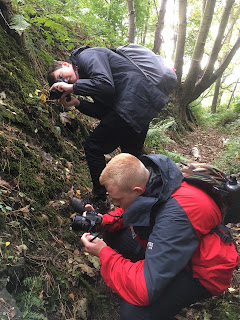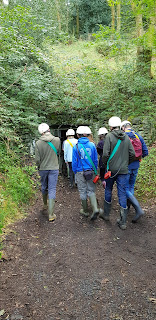“Unprecedented” – never done or known before (Oxford
Dictionaries, 2020)
2020 has seen storm after storm sweep
across the UK, floods surge through our landscape, and Covid-19 (Coronavirus) arrive
on our shores and impact our lives – all of which have been described as
“unprecedented” events.
On Tuesday 25th February, approximately
1.3km away from FSC Preston Montford, the River Severn exceeded its highest
recorded level at the village of Montford. The river gauge logged a peak height
of 7.01m. For the most part this had little effect on the centre, but the view
across the fields towards Montford showed a river that appeared to be 6-7 times
its normal width. This caused erosion to the river cliff on the centre’s side
and flooding around (and possibly in) the houses of Montford Bridge.
 |
| View of swollen River Severn from the bridge at Montford Bridge. Credit: Vicky Brown |
 |
| Luckily the trees were able to save this summerhouse from floating away. Credit: Vicky Brown |
 |
| Darwin's View - usually the River Severn is between the two lines of trees in the middle of the photo. Credit: Vicky Brown |
 |
| Landslide on our path down to the river. Credit: Phil Wilson. |
Downstream in nearby Shrewsbury, the impacts
of the multiple floods were felt keenly. The water stretched across carparks
and nearly up to the bandstand in the Quarry Park. It reached the top of the
cellar windows of the houses by English Bridge, flooded many businesses, and transformed
Shrewsbury centre into a ghost town. With the town practically becoming an
island, vehicles were unable to access the town for several days via all routes
save for the Kingsland Bridge. For many people this had been the second or
third time that their properties had flooded in as many weeks.
 |
| Looking from Smithfield Road to Theatre Severn - the flood barriers are holding. Credit: Phil Wilson. |
 |
| Homes and businesses fighting the floods in St. Julian's Friars. Credit: Phil Wilson. |
 |
| Porthill Bridge becomes the 'bridge to nowhere' as the River Severn takes over the bottom of the Quarry Park. Credit: Phil Wilson. |
 |
| Transport restrictions are put into place due to rising flood waters. Credit: Phil Wilson. |
These flood events were history in the
making and tutors spent their time monitoring the Environment Agency’s online
river gauges and were out taking photos to remember the occasion but to also assess
the safety of our fieldwork locations.
Now we are in March and the next unprecedented event is upon
us – the Covid-19 coronavirus. The Prime Minister, Boris Johnson, declared on
Wednesday that all UK schools are due to close to all but the children of key
workers as of Friday 20th March. This will, I am sure, leave many
parents, guardians and children unsure of how they will face the upcoming
weeks…, months…, who knows? The Education Team are certainly feeling a little
redundant; what are we supposed to do now? No schools means no fieldtrips!
However, ever the optimists, we have realised that this
unique, unprecedented situation poses a great opportunity for people to
reconnect with nature. Therefore, as well as planning to develop our centre
grounds and updating our risk assessments for lesser visited sites, we have
tried to come up with a list of things that you could potentially do alone or
with your families during these uncertain times:
1. Get arty! Spring has officially arrived, and the natural
world is changing. This springtime display could be captured by watercolour,
pastels, photography or any other medium you wish to use. For younger artists, challenge
them to use natural materials to create their masterpiece.
 |
| Love natural art. Credit: Charlotte Timerick |
2. Be a modern day Beatrix Potter. Miss Potter loved to write stories about the animals that lived in her garden; why not come up with stories about the creatures that visit you? You could then share these with loved ones via social media, by email or by phone.
3. Do you have one of our fold-out FSC identification guides?
Brilliant. Take it out on a walk with you, away from the crowds, and see what
you can discover in your local area. We suggest the Mammal Tracks and Signs
Chart, the Tree Name Trail, and the Features of the Shropshire Hills, but any
will do depending on your interests. Furthermore, who said walks were just for
the day time? Visit a familiar location that you can safely navigate (even your
own garden will suffice) and take along our FSC Night Sky Chart, so that you
can discover the stars – don’t forget a torch though!
4. Find a Citizen Science project to be involved with.
Citizen Science is about members of the general public collecting and/or
analysing scientific data, typically as part of a project run by professional
scientists. It allows the collection of vast amounts of data that a few
scientists could never hope to achieve in the same timeframe, therefore
advancing scientific knowledge much more quickly. It’s also great fun. To get
you started, have a look at Zooniverse https://www.zooniverse.org/projects
or the Natural History Museum https://www.nhm.ac.uk/take-part/citizen-science.html
or the Open Air Laboratory (OPAL) https://www.opalexplorenature.org/surveys.
 |
| Taking part in the RSPB Big Garden Bird Watch in 2017. |
5. Record the wildlife in your garden, or in your local area using iRecord. iRecord is a website and app that allows you to submit biological records (for example, J.Bloggs found a hedgehog on the front lawn of FSC Preston Montford on the 20/03/2020). This information allows us to build up a picture of where different species are around the UK. If it is done regularly, then we can see how a species’ location, or distribution, is changing and may be able to conserve or manage it better.
6. Design an iSpy game or treasure hunt for your household. This
could be a simple list of things to find on a walk or it could be a complicated
clue finding mission that sends explorers to every nook and cranny of your
chosen area.
7. Grow your own…sunflower, carrots, wild flower meadow. What
is more joyous than seeing a little seedling grow each day into a beautiful
plant? You could even have competitions to see whose is the tallest, widest, or
produces the most flowers.
 |
| Preston Montford's annual meadow in full flower. Credit. Charlotte Timerick |
8. Build a den. You can make a den from anything. Just go
wild!
9. Improve your wildlife identification skills. We recommend
using the iSpot website, which allows you to upload photos and details of the
plants and animals that you find. Experts respond to you to let you know what
species it is or, if you made a guess, if your identification was correct. If
you have the basics covered and have a more advanced identification book that
has been sitting on a shelf gathering dust, take this moment to dust it off and
get practising.
10. Share your knowledge and green space online. If you are
passionate about the natural world and have something to share or just have a lovely
green space near you, then pick up a camera/phone/other device and get videoing.
The FSC are currently working towards making some #fieldworklive videos for
school students to aid their knowledge. https://www.field-studies-council.org/2020/03/20/fsc-to-launch-fieldworklive-with-encounter-edu/.
So, the events of 2020 have so far been unprecedented. Well,
I encourage you to have an unprecedented positive reaction! Look after one
another, enjoy the natural world as safely as possible and lets make 2020 the
year the world reconnects with nature.
Note: Please follow strict social distancing
guidelines and remain in your own neighbourhood at this difficult time.
Source:
Lexico:
Powered by Oxford. 2020. Oxford Dictionaries: Unprecedented.
[online] Available at: <https://www.lexico.com/definition/unprecedented>
[Accessed 23 March 2020].

































